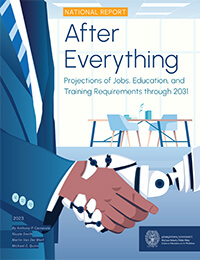For years, the debate about higher education has centered on one question: Is college still worth it?
At Lumina Foundation, we’ve been tracking this conversation closely. Our 2025 State of Higher Education study, conducted in partnership with Gallup, reveals a paradox that’s both troubling and hopeful: Most Americans believe college costs too much—but they also believe it’s worth it.
So, what do we do with this contradiction? Let’s break it down.
The hard truth about college costs
It’s no secret that college is expensive. Our survey found that just 18 percent of adults without a degree believe tuition at four-year colleges is fair. The number is a bit better for two-year colleges—40 percent see those costs as fair—but the message is clear: Americans think higher education is overpriced.
And yet, despite these concerns…
Americans still believe in the power of a degree
Here’s where things get interesting. Even though people feel tuition is unfair, they overwhelmingly recognize the value of a degree:
- 70 percent of adults without a college degree say a bachelor’s degree is extremely or very valuable.
- 55 percent say the same about associate degrees.
- Even among those who have never enrolled, 63 percent believe a bachelor’s degree would be worth it for them.
Clearly, the belief that college matters hasn’t disappeared—it’s just clouded by frustration over affordability.
The payoff: why Americans still see college as a smart investment
If college is “too expensive,” why do people still want a degree? Because they see it as a fast track to financial and career success.
Our survey found that:
- 86 percent of adults believe a degree pays off within 10 years.
- 58 percent believe it pays off within just 5 years.
- 91 percent of current bachelor’s degree students say their investment in college is worth it.
Even those who left school before finishing still see the value—64 percent of stopped-out students believe earning a four-year degree would be worth it.
And the data backs them up: By 2031, 41 percent of “good jobs” will require a bachelor’s degree or higher and 71 percent will require some form of education beyond high school. The return on investment (ROI) is real.
Here’s where higher ed needs to step up
If Americans still believe in the power of a degree, why is public confidence in higher education declining?
Because too many people feel that college isn’t adapting to their needs.
- 68 percent of adults believe higher education is headed in the wrong direction.
- Of those lacking confidence in higher ed, 37 percent say college doesn’t teach relevant skills for today’s workforce.
- Cost is the No. 1 barrier preventing many people from enrolling or completing their degree.
The challenge for colleges and universities is clear: Make education more affordable and ensure degrees lead to real career success.
Now, here’s what colleges and policymakers must do
There are solutions.
To restore public trust in higher education, we need to:
- Make college more affordable. Rising tuition costs are eroding confidence. More financial aid, debt-free pathways, and tuition transparency are critical.
- Align degrees with careers. Students want education that leads to real jobs—curriculum and training need to match today’s workforce needs.
- Expand alternative pathways. Not everyone wants or needs a four-year degree. Short-term credentials, certificates, and industry certifications can provide faster, cost-effective routes to good jobs.
- Be transparent about ROI. Colleges must do a better job of proving their value—showing students the clear link between their degree and future earnings.
A degree still matters—but higher ed must evolve
The debate over cost vs. value will define the future of higher education.
The public still believes in college, and students still see its worth. But trust in the system is eroding—and that’s a problem we can’t ignore.
If we want to restore confidence in higher education, we need to fix the affordability issue, better align education with careers, and prove to students that their investment will pay off.
The good news? We can. The solution isn’t to abandon college—it’s to make it work better for everyone.

